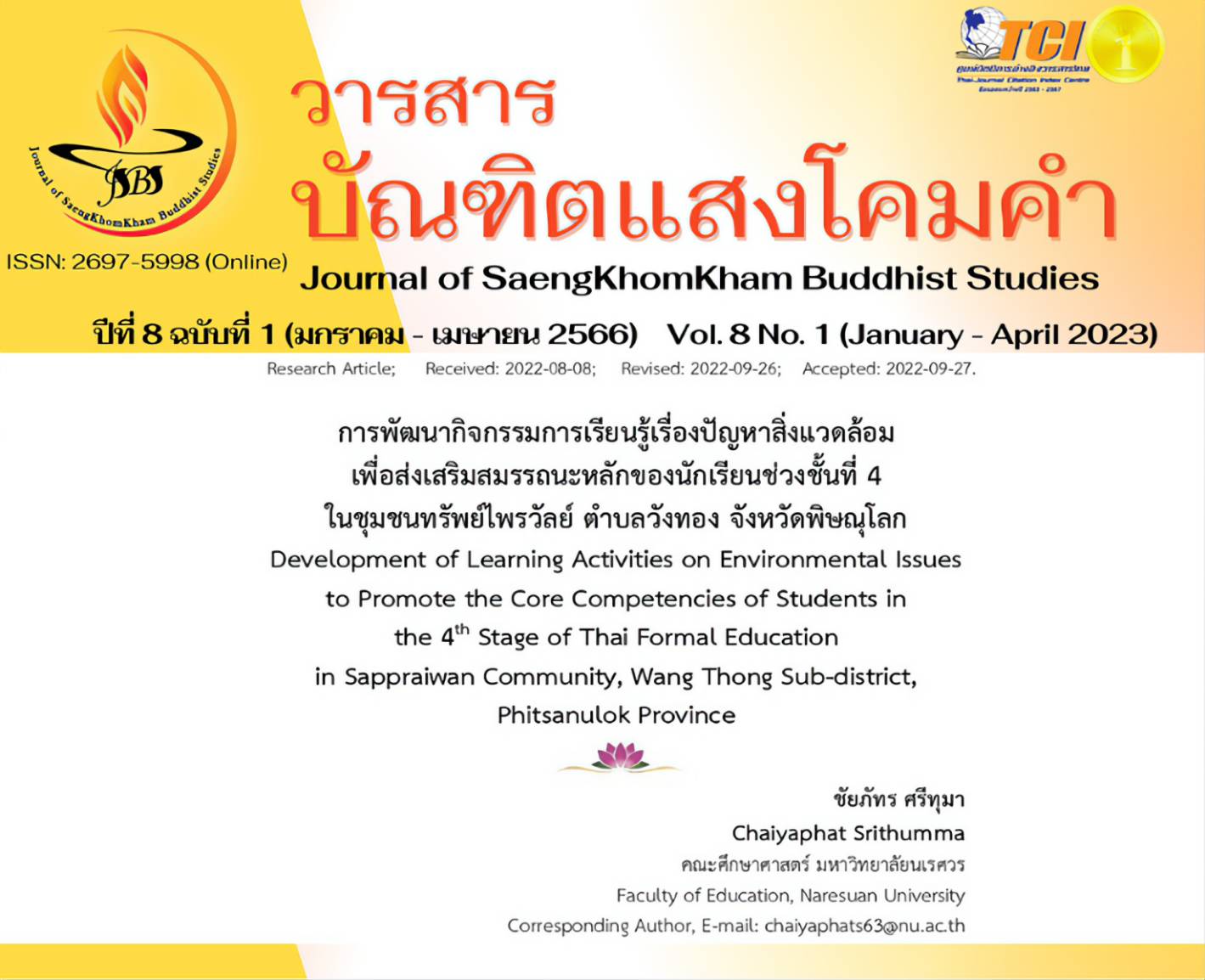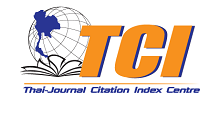การพัฒนากิจกรรมการเรียนรู้เรื่องปัญหาสิ่งแวดล้อมเพื่อส่งเสริมสมรรถนะหลักของนักเรียนช่วงชั้นที่ 4 ในชุมชนทรัพย์ไพรวัลย์ ตำบลวังทอง จังหวัดพิษณุโลก
คำสำคัญ:
การพัฒนากิจกรรมการเรียนรู้, ปัญหาสิ่งแวดล้อม, สมรรถนะหลักบทคัดย่อ
บทความวิจัยนี้มีวัตถุประสงค์ 1) เพื่อศึกษาสภาพปัจจุบันของปัญหาสิ่งแวดล้อมด้านต่าง ๆ ของชุมชนทรัพย์ไพรวัลย์ ตำบลวังทอง จังหวัดพิษณุโลก และ 2) เพื่อพัฒนากิจกรรมการเรียนรู้เรื่องปัญหาสิ่งแวดล้อมเพื่อให้เกิดการส่งเสริมสมรรถนะหลักของนักเรียนช่วงชั้นที่ 4 ภายในชุมชนทรัพย์ไพรวัลย์ ตำบลวังทอง จังหวัดพิษณุโลก งานวิจัยนี้เป็นงานวิจัยเชิงคุณภาพ เครื่องมือวิจัยประกอบด้วย 1) แบบสัมภาษณ์เชิงลึก 2) แผนการจัดกิจกรรมการเรียนรู้ และ 3) แบบประเมินสมรรถนะ กลุ่มผู้ให้ข้อมูลหลัก คือ บุคลากรในหน่วยงานภาครัฐ ชาวบ้านในชุมชน ครูสอนในโรงเรียนและผู้เรียน ใช้วิธีการเลือกแบบเจาะจง ขอบเขตพื้นที่การวิจัย คือ ชุมชนทรัพย์ไพรวัลย์ หมู่ที่ 3 ตำบลวังทอง จังหวัดพิษณุโลก วิเคราะห์ข้อมูลแบบสร้างข้อสรุป
ผลการวิจัย พบว่า 1) สภาพปัจจุบันของปัญหาสิ่งแวดล้อมในชุมชนทรัพย์ไพรวัลย์ ได้แก่ การใช้ประโยชน์ที่ดิน การใช้ประโยชน์จากแหล่งน้ำและการบริหารจัดการขยะ ซึ่งสาเหตุมาจากการดำเนินกิจกรรมทางเศรษฐกิจและการท่องเที่ยว 2) ผลการพัฒนากิจกรรมและผลการจัดกิจกรรมการเรียนรู้พบว่า สภาพปัจจุบันการจัดการเรียนรู้ ได้แก่ ปัญหาการเตรียมการจัดการเรียนรู้ การจัดกิจกรรมของสถานศึกษาและการใช้เทคนิควิธีการสอน ด้วยเหตุนี้ จึงได้พัฒนากิจกรรมการเรียนรู้เรื่องปัญหาสิ่งแวดล้อมเพื่อให้สอดคล้องกับการส่งเสริมสมรรถนะหลักของนักเรียนช่วงชั้นที่ 4 คือ กิจกรรมการเรียนรู้ “ความจริงแล้วผม คือ...วัยรุ่นหัวใจสีเขียว” การจัดกิจกรรมดังกล่าวเกิดผลลัพธ์ที่ดีในด้านผู้เรียน ผู้สอน สื่อการเรียนรู้ การวัดและประเมินผล องค์ความรู้ที่ได้จากการวิจัย คือ ปัญหาสิ่งแวดล้อมเกิดจากปัจจัยต่าง ๆ ซึ่งส่งผลต่อการดำรงชีวิตของสิ่งมีชีวิตและการพัฒนาการเรียนรู้ของผู้เรียนควรเป็นกิจกรรมที่หลากหลายและสามารถนำไปใช้ได้กับการดำเนินชีวิตประจำวันได้
Downloads
เอกสารอ้างอิง
กรมควบคุมมลพิษ. (2562). แผนปฏิบัติการขับเคลื่อนวาระแห่งชาติ การแก้ไขปัญหามลพิษด้านฝุ่นละออง. กรุงเทพมหานคร: กระทรวงทรัพยากรธรรมชาติและสิ่งแวดล้อม.
กรมส่งเสริมคุณภาพสิ่งแวดล้อม. (2545). การอนุรักษ์สิ่งแวดล้อม, พิมพ์ครั้งที่ 5.กรุงเทพมหานคร: กรมส่งเสริมคุณภาพสิ่งแวดล้อม กระทรวงทรัพยากรธรรมชาติและสิ่งแวดล้อม.
กระทรวงศึกษาธิการ. (2551). หลักสูตรแกนกลางการศึกษาขั้นพื้นฐาน พุทธศักราช 2551. กรุงเทพมหานคร: ชุมนุมสหกรณ์การเกษตรแห่งประเทศไทย.
คณะกรรมการอิสระเพื่อการปฏิรูปการศึกษา. (2562). คู่มือครูการนำกรอบสมรรถนะหลักของผู้เรียนระดับชั้นประถมศึกษาปีที่ 1-3 ไปใช้ในการพัฒนาผู้เรียน. กรุงเทพมหานคร: สำนักงานเลขาธิการสภาการศึกษา.
ชุติมา มั่นเหมาะ. (2562). การจัดกิจกรรมเสริมศักยภาพการเรียนรู้ประวัติศาสตร์เมืองเก่าพิจิตรบนฐานชุมชน. วิทยานิพนธ์ปริญญาการศึกษามหาบัณฑิต มหาวิทยาลัยนเรศวร.
สุขขี คำนวณศิลป์. (2550). การมีส่วนร่วมของประชาชนในการอนุรักษ์สิ่งแวดล้อมอุทยานแห่งชาติใต้ร่มเย็น อำเภอบ้านนาสาร จังหวัดสุราษฎร์ธานี. วิทยานิพนธ์ปริญญาศิลปศาสตรมหาบัณฑิต มหาวิทยาลัยราชภัฏภูเก็ต.
สุจิตรา ตรีรัตนนุกูล. (2562). การพัฒนากิจกรรมการเรียนรู้เชิงประสบการณ์สำหรับส่งเสริมกรอบความคิดด้านเชาวน์ปัญญาของนักศึกษาระดับอาชีวศึกษา. วิทยานิพนธ์ปริญญาวิทยาศาสตรมหาบัณฑิต มหาวิทยาลัยบูรพา.
อนุรักษ์ ปิ่นทอง. (2543) การศึกษาปริมาณโลหะหนักในน้ำชะขยะมูลฝอยและน้ำบาดาลบริเวณใกล้เคียงสถานที่ฝังกลบขยะมูลฝอยของเทศบาลนครพิษณุโลก. วิทยานิพนธ์ปริญญาวิทยาศาสตรมหาบัณฑิต มหาวิทยาลัยนเรศวร.

ดาวน์โหลด
เผยแพร่แล้ว
รูปแบบการอ้างอิง
ฉบับ
ประเภทบทความ
สัญญาอนุญาต
ลิขสิทธิ์ (c) 2023 วารสารบัณฑิตแสงโคมคำ

อนุญาตภายใต้เงื่อนไข Creative Commons Attribution-NonCommercial-NoDerivatives 4.0 International License.





